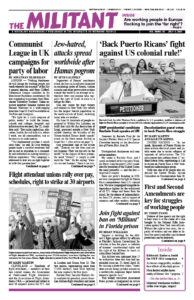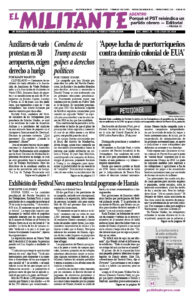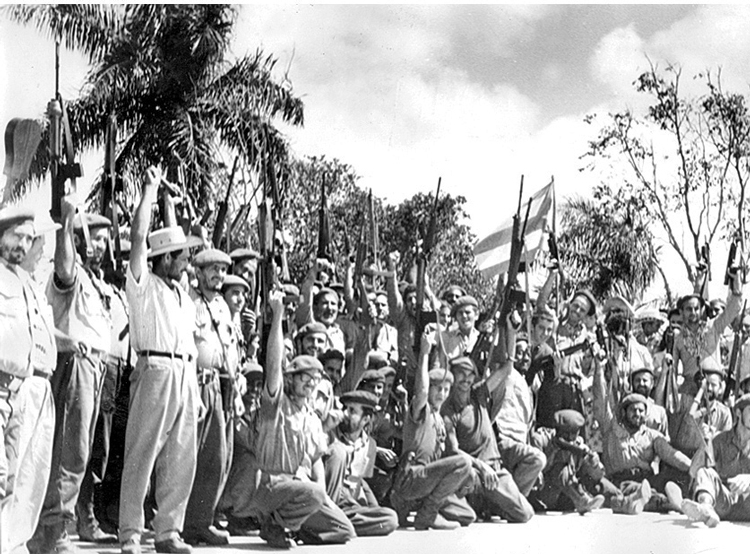Making History: Interviews with Four Generals of Cuba’s Revolutionary Armed Forces by José Ramón Fernández, Enrique Carreras, Harry Villegas and Néstor López Cuba is one of Pathfinder’s Books of the Month for July. The excerpt below is from an Oct. 20, 1997, interview with López Cuba by Socialist Workers Party National Secretary Jack Barnes and Pathfinder Press President Mary-Alice Waters. In 1957, López Cuba joined the revolutionary war led by Fidel Castro. He led a tank unit to help defend Cuba’s socialist revolution against the failed U.S.-backed mercenary invasion at the Bay of Pigs in 1961. He was an officer in Cuba’s internationalist mission to defend Angola, which helped defeat an invasion by apartheid South Africa in 1976. Copyright © 1999 by Pathfinder Press. Reprinted by permission.
Jack Barnes: As you know, the way the history of the 1962 October Crisis is written in the United States, [U.S. President John] Kennedy and [Soviet Premier Nikita] Khrushchev saved the world from nuclear holocaust. But we have always told people that the truth lies elsewhere. It was the Cuban people and its Revolutionary Armed Forces that saved the world.
Kennedy fully intended to mount an invasion of Cuba in October 1962, as he had been planning to do for more than a year. Previously classified documents released in the past few years, however, show that his hand was stayed when the Pentagon informed him that he could expect an estimated 18,000 U.S. troop casualties during the first ten days alone of an invasion. The Cuban people were armed and mobilized on a massive scale, Kennedy was told by the Joint Chiefs of Staff. The Cuban army was large for a small country, and, together with the militias, very combat-ready.
Kennedy feared the domestic political consequences as a flood of body bags began coming home. So that’s when he started seriously probing Khrushchev for a deal. …
Néstor López Cuba: It’s very true, as you say, that the armed forces, and the people of Cuba above all, played a decisive role in preventing a nuclear holocaust. Because it was understood in Washington that the people would fight and the invasion would be costly. This has been the attitude of our people from the triumph of the revolution until today, I believe. Had this consciousness not existed, they would have invaded us.
At the time of Girón, there is no question that [former U.S. President Dwight] Eisenhower had bequeathed the mercenary brigades to Kennedy, and Kennedy had to support them in the invasion. The one decision Kennedy made on his own was not to land the U.S. Marines behind the mercenaries. Had Eisenhower been in power, we believe, things would have been different; they would have sent in the marines. But Kennedy had just become president, and I think this made him stop and think a bit.
The North Americans have presented their version of the October Crisis. The Russians have told theirs. Cuba has issued important statements and published documents, above all during the conference held in Havana on the thirtieth anniversary of the crisis, attended by Fidel and McNamara, but we have not yet said our final word.
I believe that much remains to be told about the events of the October Crisis, about the role played by Fidel, the leadership of the revolution, our people, and the armed forces. …
The Soviet people — our teachers, ordinary people — showed a great deal of solidarity with us. They knew about the unilateral decisions taken by the Khrushchev government and were against them. They also knew about Fidel’s declaration that the moral missiles we possessed in Cuba were more powerful than the nuclear missiles. All these speeches reached the Soviet people.
Mary-Alice Waters: During those same days in October 1962, we were organizing demonstrations in the United States. Jack and I were both university students at that time, in different cities.
López Cuba: You were organizing support activities?
Waters: Yes. To demand “U.S. Hands Off Cuba!” “U.S. Out of Guantánamo!” “Stop the Invasion!”
Barnes: Communists in the United States had had no contact with revolutionists in Cuba when the crisis began, of course. But we supported the Cuban revolution, whole-heartedly. Some revolutionary-minded young people in the U.S., including myself, were actually won to communism in Cuba. I spent several months here in Cuba in the summer of 1960. I recall asking a Cuban compañero I had come to trust whether he thought I should stay in Cuba or go back to the United States. I wanted to stay, because we all knew the invasion was coming.
“Go back to the United States,” he told me, “and make a revolution there.”
I decided he was right. And I’ve never gone back on that agreement.
During the October Crisis there were a few older socialists in the United States who had been worn down by the retreat of the labor movement and the McCarthyite witch-hunt during the 1950s; they held the view that there was nothing much anyone could do. “Either the Russians and the Americans will go to war or they won’t,” they said. “It’s too late to demonstrate.” …
We responded, “Well, all we can do is fight. Washington has to know they will pay a price if they go to war against Cuba.”
The big majority in the communist movement in the U.S. — young or old — responded as we did. We knew the Cuban people were ready to fight, and we were determined to fight alongside them. The most important lesson for young revolutionists to learn is that the imperialists pause only when they have to face those who are ready to fight like you are in Cuba. Otherwise one starts believing that all of history is negotiated by big governments.
López Cuba: What you say is very important because popular pressure in the United States is what forced the U.S. government to pull its troops out of Vietnam.
The Cuban revolution today remains on a firm footing. At the same time, the U.S. government knows that the progressive people of the United States, the working people, will take to the streets to oppose an attack on Cuba, as they did during Vietnam. There is solidarity with Cuba around the world, as well, and this too has acted as a brake on Washington.


